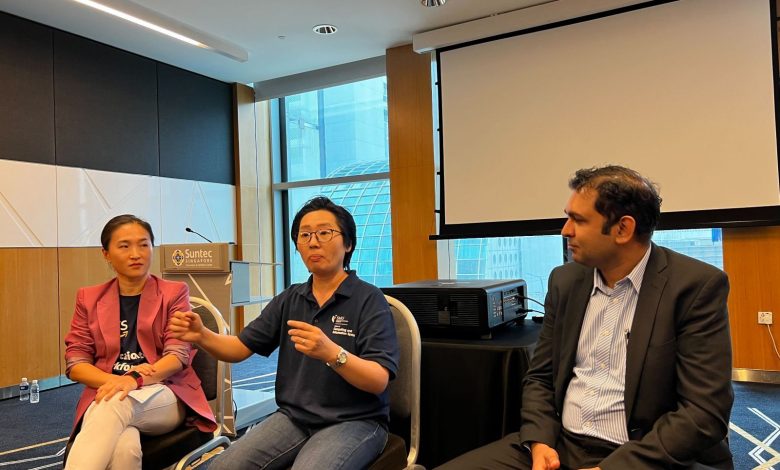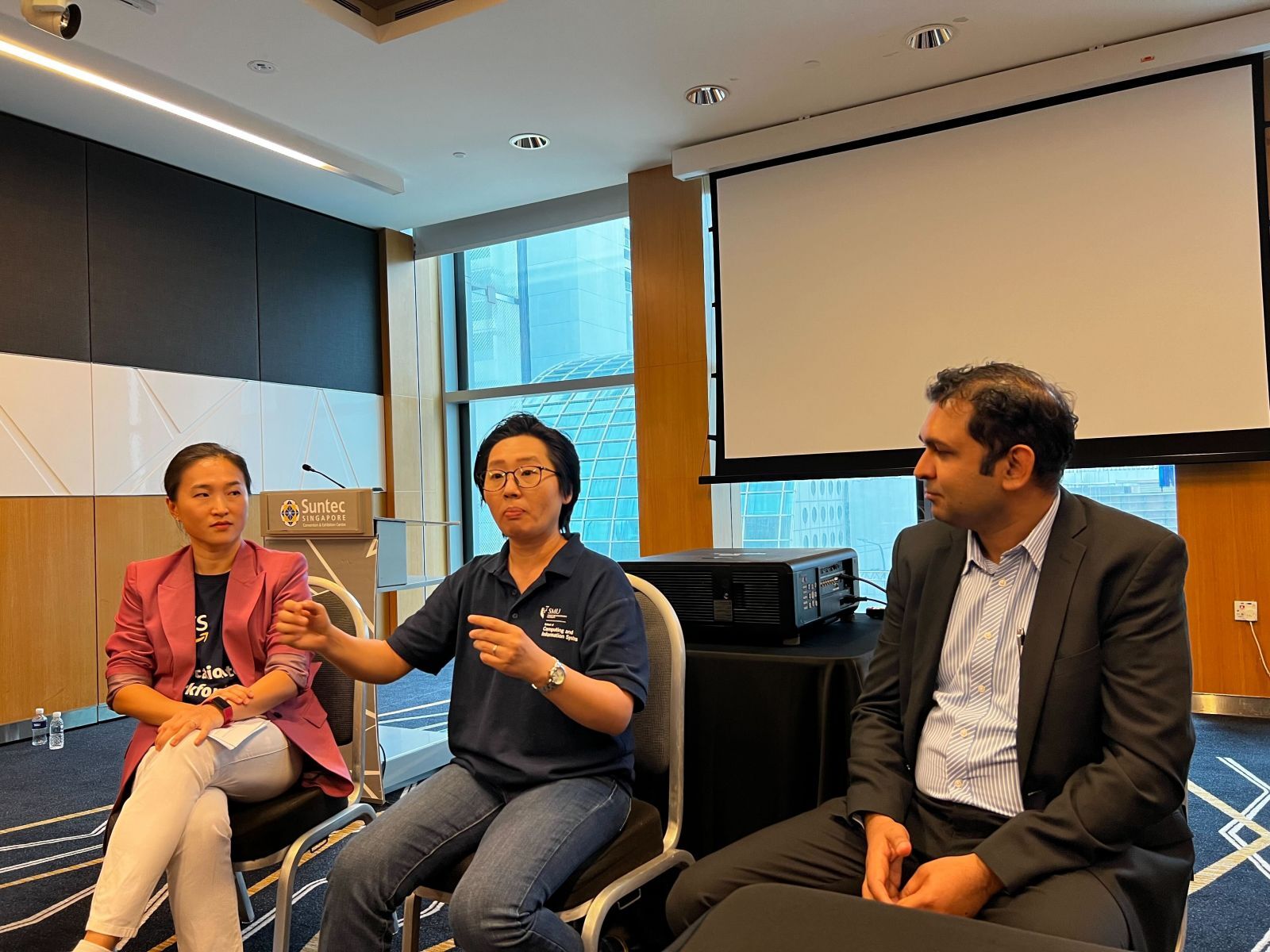
A key strategic development engine for governments and corporations alike, cloud computing has become ubiquitous. The enormous development possibility of cloud enterprises, according to IDC, will cause Southeast Asian companies to generate more than 15% of their revenue from digital products and services by 2023.
Moving towards the cloud isn’t always an easy feat, especially considering the pressing concern that is the lack of skilled workers in this field. An analysis from AlphaBeta, as presented in its “Building Digital Skills for the Changing Workforce” report, highlights the importance for both employees and companies to acquire and master digital skills in order to fully realise the potential of technological advancements—particularly those of the cloud.
In other words, there is a massive need for cloud- and tech-related training and development. And one area of focus, as AlphaBeta found, is the ability to use cloud-based technologies, such as cloud developer tools, cloud communication software, cloud accounting software and cloud CRM software.
That should be unsurprising given the widespread use of cloud technology in the region, which is in turn driving the high demand for cloud-related skills. The ability to build cloud architecture and move on-premises infrastructure to the cloud are two examples of advanced cloud computing skills that rank in the top 10 in demand. Due to the cloud’s convenience, adaptability, and scalability, it has become an integral aspect of many companies’ digital transformation strategies.
AWS Provides Education to ASEAN
 During the AWS Public Sector Summit held in Singapore, Data & Storage ASEAN (DSA) interviewed Emmanuel Pillai, Head of AWS Training and Certification for ASEAN at AWS, and Shang Gao, Regional Lead of Education to Workforce, Asia Pacific Japan at AWS. Pillai and Gao shared with DSA their insights on the region’s apparent lack of digitally skilled workers—something AWS is trying to bridge.
During the AWS Public Sector Summit held in Singapore, Data & Storage ASEAN (DSA) interviewed Emmanuel Pillai, Head of AWS Training and Certification for ASEAN at AWS, and Shang Gao, Regional Lead of Education to Workforce, Asia Pacific Japan at AWS. Pillai and Gao shared with DSA their insights on the region’s apparent lack of digitally skilled workers—something AWS is trying to bridge.
Specifically, AWS has been providing training to underserved communities, who typically face greater challenges in gaining access to digital skills training opportunities. These underserved sectors that AWS is serving include women, at-risk youth, unemployed individuals, rural people and low-skilled migrant workers.
AWS has been investing hundreds of millions of dollars to provide free training around the world as part of its mission to help 29 million people worldwide increase their technical abilities by 2025. The company believes opportunities in digital careers should be available to anybody eager to learn, and AWS is providing such opportunities through these initiatives:
AWS is also supporting organisations in the region in terms of digital- and cloud-related education training with these initiatives:
- In Malaysia, AWS is collaborating with the Department of Polytechnic and Community College Education and Malaysia’s Ministry of Higher Education (MOHE) on the pilot project ‘ROBONEO AWS DeepRacer Challenge’ in Sabah. This project aims to pique students’ interest in cloud computing, robotics and machine-learning.
- In Thailand, AWS has partnered with the Thai Government’s Digital Economy Promotion Agency and King Mongkut’s Institute of Technology Ladkrabang to run a boot camp and a job fair for over 200 students to prepare them for the digital workforce.
- In Vietnam, AWS is working with USAID (United States Agency for International Development) to help modernise the curricula of the country’s top seven universities. AWS is also providing technical support and educator training to help said universities integrate cloud content into their degree courses.
- In Singapore, AWS is collaborating with Skilio, a skills-based hiring platform, to help graduates with their tech job search. Additionally, AWS is supporting the Singapore Management University’s ‘Women in Tech’ group by offering cloud essential knowledge and skills for women and girls to be successful in the digital workforce.
- In Indonesia, AWS is introducing high school students and vocational students (including those with disabilities) to cloud fundamentals through the AWS Laptops for Builders free program. The program is supported by the Indonesian Government and local organisations Sagasitas and Nahdatul Ulama. As part of the program, AWS is donating laptops to schools across the country.
AWS has trained over 3.5 million individuals across Asia Pacific and Japan in cloud skills since 2017. Their Training, Certification and Education programs across Indonesia, Malaysia, the Philippines, Singapore, Thailand and Vietnam are helping build ASEAN’s digitally skilled talent pool for the future. AWS remains committed to working alongside governments, institutions, and industries to boost digital capabilities and help close the skills gap.
 “We want to ensure workers become digitally savvy and employers drive business growth so that everyone can contribute to ASEAN’s future economic prosperity,” Shang said.
“We want to ensure workers become digitally savvy and employers drive business growth so that everyone can contribute to ASEAN’s future economic prosperity,” Shang said.
Cloud Awareness is Rising in ASEAN
Based on the cloud skills training AWS is doing in the region, Gao believes ASEAN countries are deeply committed to moving towards digital adoption and achieving their digital economy goals. In fact, since Indonesia launched its roadmap for Industry 4.0 in 2018, almost all ASEAN countries have followed suit in announcing their plans. That AWS has trained over 700,000 individuals across ASEAN with cloud skills since 2017 is a testament to the region’s commitment to skilling, upskilling and reskilling workers to keep up with digitalisation. This number compares favourably with the European Union (EU), where AWS has trained over 800,000 individuals with cloud skills since 2017.
AWS is working with Southeast Asian nations to access the cloud and continue their momentum in achieving their respective digital goals, in line with their national technology agendas. Little wonder the region’s levels of cloud awareness, knowledge and maturity are rising impressively.
The Demand for Digitally Skilled Workers
As more organisations move their IT to the cloud, AWS expects even more widespread adoption of cloud computing, machine-learning, data analytics and cybersecurity in the region, in turn opening up countless job opportunities for digitally skilled workers. According to the same “Building Digital Skills for the Changing Workforce” report, in fact, the Asia Pacific and Japan region will need to train an estimated 86 million more workers to keep up with demand.
Pillai said that as the ASEAN region undergoes a rapid digital transformation, more must be done to ensure the workforce is equipped with digital skills and, therefore, be future-ready. Unfortunately, there is a widening IT skills gap, with AlphaBeta reporting that many non-tech workers are feeling unprepared for the digitised future due to a lack of digital skills training. In Singapore and Indonesia, for example, only 52% of non-tech workers get digital skills training at least once a year, yet 82% who do not currently receive any training want it. Suffice it to say, employers need to reciprocate this willingness by showing the urgency to upskill and reskill their workers—now. AWS is helping in this regard, and it is ready to do more.
“We have been working to address the digital skills gap in the ASEAN region with training programs for the most in-demand cloud skills so that people are able to grow their careers, organisations can expand and innovate, and communities can thrive,” Pillai said.
To that end, governments and public sectors need to have main components and priorities to enhance the number of cloud experts and digitally skilled workers. Though it is a given that every government, depending on its leaders, will have different priorities as they embark on its journey to becoming a digital economy powerhouse. AWS can help in this regard as well, and its focus, in this case, includes the following:
- Upskilling and reskilling the existing workforce: Public sector organisations must work together to ensure the existing workforce is being upskilled and reskilled at scale to keep up with the rapid pace of technological disruption. Governments and public sector organisations need to provide both tech and non-tech workers with training for the most in-demand digital skills because jobs will continue to evolve.
- Building a diverse talent pool: Governments and public sector organisations should focus on building a diverse talent pool and providing access to custom training programs that cater to current and future needs. Worldwide, change is occurring rapidly, and there will likely be jobs in 2030 that are non-existent at the moment. Governments, public sector organisations and individuals, therefore, must remain agile and forward-looking when it comes to upskilling.
- Nurturing the talent pool: Nurturing the current talent pool is just as important as building the next generation of cloud talent. AWS is achieving that through AWS education programs, including AWS Academy, AWS Educate, and AWS re/Start, all of which help prepare individuals for vital cloud careers. AWS collaborates with higher education institutions, non-profits, workforce development organisations, governments, and employers for these undertakings. It is also committed to creating equitable learning opportunities for a diverse population and ensuring that opportunities are accessible to all—from the school to the workforce.
Profit to Gain by Reskilling Workforce
Organisations across ASEAN that reskill and upskill their employees will reap the benefits of having a future-ready workforce. Having an ongoing digital skills training strategy can help with talent retention, reduce hiring costs, drive greater efficiency and productivity, and ensure that organisations are robust and highly adaptable.
“Our skilling program with local e-commerce fashion brand, Zalora, has trained over 300 engineers and enabled the Zalora team to deliver products to market 15 to 30% faster,” said Pillai. “Our AWS digital skills training initiatives are also having a positive impact on AWS customers—Globe, in the Philippines, and Techcombank, in Vietnam.”

Across the ASEAN region, cloud skills are not only essential for tech-related jobs but also for human resources, business analytics and marketing roles. As digital transformation gains pace, more organisations will require employees across a wide range of job roles and levels to have the latest digital skills.
All things considered, embracing lifelong digital learning is a collective effort from governments, organisations, educational institutions, employers, and individuals. The need for digital skills was at an all-time high during the pandemic and will persist as technology continues to advance. Such is the case with cloud computing, where demand for cloud-skilled workers is expected to triple by 2025, according to AlphaBeta.
“AWS is providing more equitable learning opportunities, with the goal of nurturing a diverse digital workforce. We are collaborating with governments and educational institutions to incorporate the latest cloud content into mainstream education curriculums so that students can gain in-demand cloud skills and are prepared for entry-level jobs. It has been inspiring to see students across ASEAN leveraging AWS Education Programs to increase their employability and drive industry innovation when they enter the workforce,” concluded Gao.
With its commitment to developing digital experts in the region, expect AWS to continue with its undertakings—and do even more in the future.




